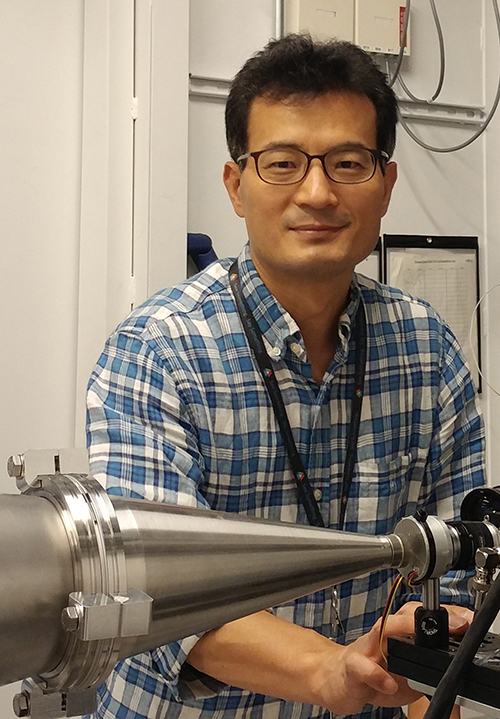
Sungsik Lee of the U.S. Department of Energy’s Advanced Photon Source (APS), and colleagues from University College London, the University of Cambridge, Tufts University, and the University of California, Santa Barbara, have been awarded the 2022 Faraday Division Horizon Prize by the Royal Society of Chemistry (RSC) for the development of single-atom alloys, a new class of catalysts that play a prominent role in the energy and sustainability fields.
Lee is a physicist with the X-ray Science Division Chemical & Materials Science Group at the Argonne National Laboratory APS.
According to the RSC, Chemistry is fundamentally about transforming one molecule into another, often with the aid of catalysts. Almost all large-scale industrial chemical processes that produce the chemicals needed for the 21st century use heterogeneous catalysts developed largely by trial-and-error experimentation during the 20th century. Many of these processes are energy-inefficient and entail enormous carbon footprints, so catalysts with superior performance are urgently needed for a more sustainable future.
Single-atom alloys (SAAs) developed by the team are novel catalysts that utilize precious metals at the ultimate limit of atom efficiency and provide great opportunities for greener, cheaper and more efficient chemical processes.
Guided by physical insights obtained by theory, as well as simulations on supercomputers, they have demonstrated the design of SAA catalysts that promote process efficiency and low energy utilization, reduce waste or by-products and exhibit longer catalyst lifetimes than "traditional" catalysts, for favorable chemical process economics.
SAAs are thus envisioned to be the catalysts of the future for various applications, including energy storage and clean air technologies as well as renewable fuels and chemicals manufacturing.
The Horizon Prizes highlight the most exciting, contemporary chemical science at the cutting edge of research and innovation. These prizes are for teams or collaborations who are opening new directions and possibilities in their field, through ground-breaking scientific developments.
“This award to Sungsik and his collaborators not only recognizes the importance of their groundbreaking work on single atom,” said Jonathan Lang, XSD director, “but also the value and strength that derives from multinational and multi-institution cooperative research.”
The Advanced Photon Source is a DOE Office of Science User Facility operated for the DOE Office of Science by Argonne National Laboratory under Contract No. DE-AC02-06CH11357
The U.S. Department of Energy's APS at Argonne National Laboratory is one of the world’s most productive x-ray light source facilities. Each year, the APS provides high-brightness x-ray beams to a diverse community of more than 5,000 researchers in materials science, chemistry, condensed matter physics, the life and environmental sciences, and applied research. Researchers using the APS produce over 2,000 publications each year detailing impactful discoveries, and solve more vital biological protein structures than users of any other x-ray light source research facility. APS x-rays are ideally suited for explorations of materials and biological structures; elemental distribution; chemical, magnetic, electronic states; and a wide range of technologically important engineering systems from batteries to fuel injector sprays, all of which are the foundations of our nation’s economic, technological, and physical well-being.
Argonne National Laboratory seeks solutions to pressing national problems in science and technology. The nation's first national laboratory, Argonne conducts leading-edge basic and applied scientific research in virtually every scientific discipline. Argonne researchers work closely with researchers from hundreds of companies, universities, and federal, state and municipal agencies to help them solve their specific problems, advance America's scientific leadership and prepare the nation for a better future. With employees from more than 60 nations, Argonne is managed by UChicago Argonne, LLC, for the U.S. DOE Office of Science.
The U.S. Department of Energy's Office of Science is the single largest supporter of basic research in the physical sciences in the United States and is working to address some of the most pressing challenges of our time. For more information, visit the Office of Science website.
